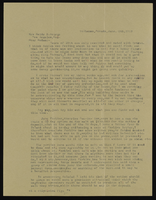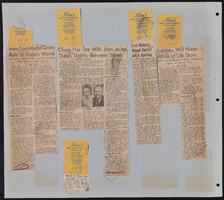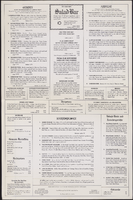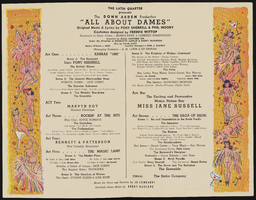Search the Special Collections and Archives Portal
Search Results
Edythe and Lloyd Katz Photographs
Identifier
Abstract
The Edythe and Lloyd Katz Photographs (1947-1986) contain photographs of the businesses operated by Las Vegas, Nevada entrepreneurs Edythe and Lloyd Katz. The photographs primarily depict the movie theaters purchased by the Katz Family, including the Guild Theatre (formerly the Palace Theatre) and the Fremont Theatre. The photographs also depict the Katz Family and the Helldorado Days parade.
Archival Collection

Correspondence, Levi Syphus to Sadie George
Date
Archival Collection
Description
Text
Leon Rockwell Papers
Identifier
Abstract
The Leon Rockwell Papers (1829-1986), consist of materials that document Leon Rockwell's life in Las Vegas, Nevada from 1906 until his death in 1968. Included are diaries, correspondence, photographs, postcards, Las Vegas community event programs, ledger sheets, business cards, and scrapbooks. There are a number of books, information on organizations and businesses that Rockwell owned, real estate documents, and early records of the Las Vegas Volunteer Fire Department, of which Rockwell was an original member.
Archival Collection
May Bradford Photograph Collection
Identifier
Abstract
The May Bradford Photograph Collection (1870-1976) consists primarily of black-and-white photographs depicting Bradford's life including her time in Tonopah, Nevada. The collection also includes images of her early life and her family in Missouri. Other photographs document her son as an infant, as well as the family's time spent living abroad.
Archival Collection
Grace Hayes Photograph Collection
Identifier
Abstract
The Grace Hayes Photograph Collection consists of black-and-white photographic prints and negatives from approximately 1890 to 1980. The collection includes personal photographs of Hayes and her son Peter Lind Hayes and publicity photographs from Hayes's entertainment career.
Archival Collection
Karl Carsony Papers
Identifier
Abstract
The Karl Carsony Papers (1918-2011) are comprised of photographs, newspaper clippings, ephemera, and artifacts representing Karl (Schrom) Carsony's acrobatic career and personal life. The bulk of the materials in this collection date from approximately the early 1950s through the late 1970s. The materials also include vacation photographs of Karl (Schrom) Carsony and his wife, Margot Meyers. The materials also include promotional photographs, posters, and fliers for the Carsony Brothers, which was an acrobatic show consisting of Karl Carsony and his twin brothers, Joe and Bert Schrom.
Archival Collection
Vern Lanegrasse Papers
Identifier
Abstract
The Vern Lanegrasse Papers (1961-2010) consist of materials from the Brotherhood of the Knights of the Vine and the California Restaurant Writers Association as well as event programs, menus, and other materials related to food and wine.
Archival Collection



